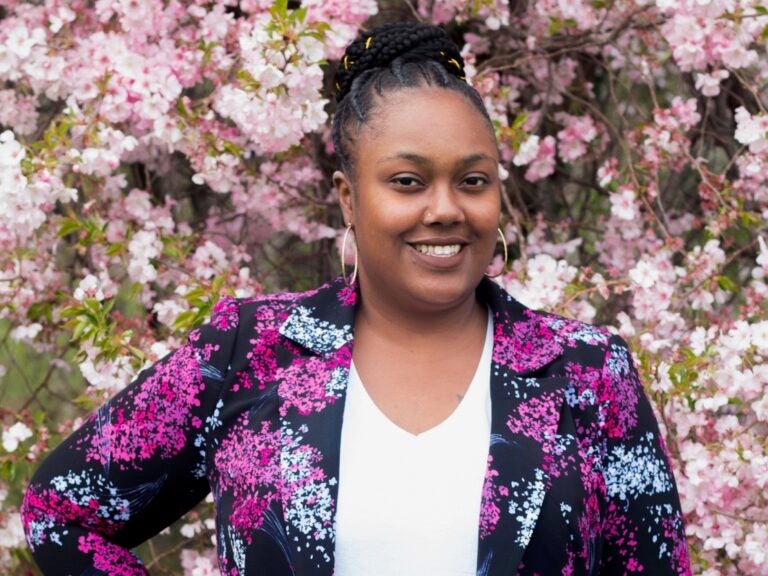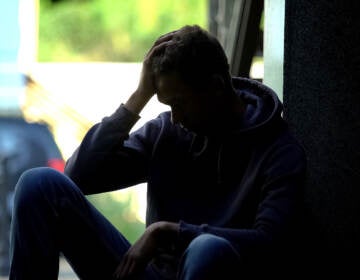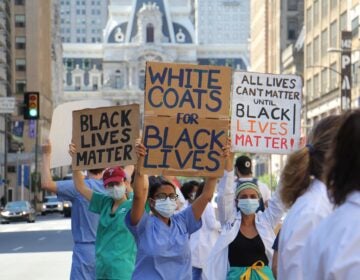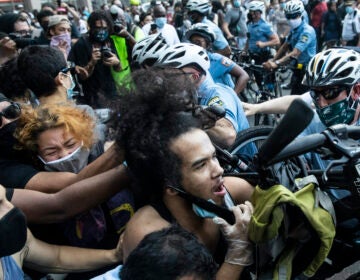Black therapist on mental health for POC in this historic moment
"What I've been able to do is relate to my clients when they are experiencing the systemic oppression and racism that weighs on all of our shoulders. I understand."
Listen 15:45
Saleemah McNeil is a Philly area psychotherapist. (Courtesy of Saleemah McNeil)
Saleemah McNeil, a Black Philadelphia psychotherapist and founder of Oshun Family Center in Jenkintown, has been raising money to provide free therapy sessions for people of color, ever since the protests over the killing of George Floyd began in May. So far, she’s raised more than $90,000.
“After seeing so many fires being set, so many stores that were being looted and just the outward display of anger and frustration and hopelessness, I knew there is a hole my community would need healing,” she said.
“Being a part of history … right now is exhilarating and scary all at the same time.”
McNeil sat down with The Why’s Shai Ben-Yaacov to discuss why she believes it’s particularly important for people of color to have access to mental health services now, and what it’s like to experience the same things her patients are going through.

Hear the whole story on The Why
Interview highlights
On the success of her fundraising effort
Never in my wildest dreams did I expected that this will be the response. Twenty-four hours from launching, I wanted to raise $5,000, I got $7,000. And I was able to quickly think of, how I could expand this? And I contacted two other clinicians and I said, we’re going to go for $15,000 so we can all do this together. And it literally was like a rocket launch from there.
I think it has, one, struck a chord with Black America and they now have a better understanding of the supports that are out there in relinquishing a bit of their control around the stigma. And, you know, this may be biased because I’m a millennial as well, but I do think the millennials are spearheading the healing process and we’re normalizing it. And on the other side, I do think that white America feels bad and [is] understanding and reckoning with the unconscious bias and the implicit bias and the systemic racism that has ultimately plagued an oppressed Black folks for generations.
On counseling others through things she’s experiencing, too
In some moments, it’s very challenging to help clients get through and heal through some of the same experiences that you are going through in the moment. I have been blessed, in a sense, to go through certain experiences like with my [traumatic birth experience] and work with women, get through their birth[s]. So I have had a crash course in kind of living in this space of helping people go through things that I experienced myself, if not in the moment, then very soon after.
So what I’ve been able to do is relate to my clients and be very transparent when they are explaining things that they are experiencing and understanding that the systemic oppression and racism that weighs on all of our shoulders, that I understand. And when I say I understand, it’s not a placating or dismissive response just to say, “I’m listening.” But it is a real response that I do understand. And I think that goes a long way in building a therapeutic relationship, because you can absolutely be detached — and you’re supposed to be emotionally detached — but I realize that I cannot be the expert in the room. And I have to join you on a level in which you feel like we are working through this thing that we call life together.
On what it was like when her family got COVID-19:
My husband is an essential worker, so he was not quarantined prior to. He was going back and forth to work every day and essentially contracted COVID and brought it home. And living through that experience was really tough because I couldn’t take a day off. I had no time to be sick. April 11th through the 17th is Black Maternal Health Week. And myself and the Maternal Wellness Village spent the last year planning events for Black Maternal Health Week. And I had to pivot because we couldn’t have any in-person activity, so we had to do everything virtually. And it was so hard to push through and do the three events that I needed to be fully present for during that time, because I was also sick.
I had to use all of my energy to make it through 90 minutes of a workshop. And I was completely exhausted and drained after 90 minutes of moderating, asking questions, and being engaging, and going to this next slide. And I just never really anticipated how much energy that it took, especially in a body that was sick. And I had to do that three times. So, you know, I don’t recommend people push through in that manner. And luckily, we did not have to be hospitalized or on ventilators or any of those tragedies. But I would say, you know, advice-wise: don’t do that. If you can cancel or delegate to someone else, then that’s what should be done.
WHYY is your source for fact-based, in-depth journalism and information. As a nonprofit organization, we rely on financial support from readers like you. Please give today.






